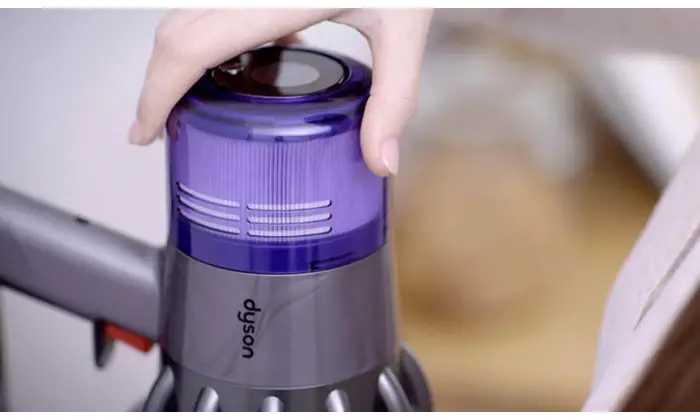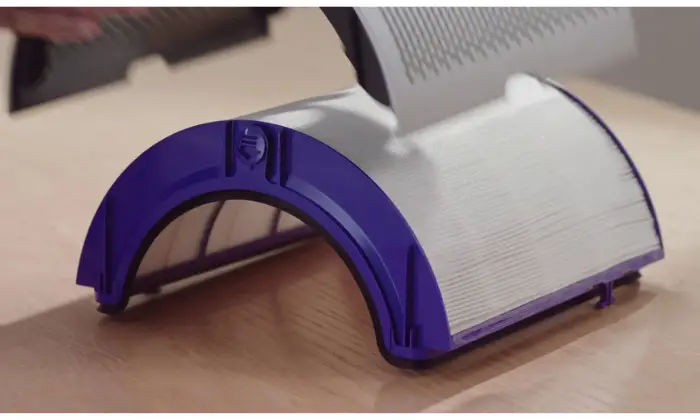Replacing Dyson filters is a simple and essential task to maintain optimal performance and indoor air quality. These filters should be regularly replaced every six months or as recommended by the manufacturer to ensure efficient function and capture of allergens, dust, and particles.
Neglecting to replace the filters can result in reduced suction power and compromised air purification. Fortunately, Dyson offers high-quality replacement filters that are specifically designed for their vacuum models, making the task effortless. By regularly replacing the filters, you can ensure that your Dyson vacuum continues to deliver powerful suction and clean, fresh air throughout your home.

How Dirty Air Affects Your Health
Dirty air can have a significant impact on your health, particularly in relation to respiratory problems. Breathing in pollutants, such as dust, pollen, and pet dander, can trigger or worsen conditions like asthma, bronchitis, and allergies. These irritants can cause inflammation in the airways, leading to difficulty breathing, coughing, and wheezing.
Moreover, prolonged exposure to dirty air can weaken the immune system, making individuals more susceptible to infections and illnesses. To mitigate these risks, it is essential to regularly replace your Dyson filters. By doing so, you ensure that your air purifier is effectively removing contaminants from the environment, improving the air quality in your home or office.
Don’t compromise your health — prioritize clean air by maintaining and replacing your filters as recommended by the manufacturer.

Understanding The Importance Of Replacing Dyson Filters
Regularly replacing the filters in your Dyson vacuum is crucial for maintaining its functionality and performance. By doing so, Replacing Dyson Filters, you ensure cleaner air, which contributes to your overall health and well-being. Cleaner air means reduced exposure to allergens, dust particles, and other impurities.
Furthermore, replacing the filters on time can help prolong the lifespan of your Dyson vacuum. When filters are clogged or dirty, the vacuum’s suction power decreases, making it less efficient in picking up dirt and debris. This puts unnecessary strain on the motor, potentially causing it to wear out prematurely.
So, make sure you stay on top of filter replacements to keep your Dyson vacuum running smoothly and to enjoy a cleaner and healthier home environment.
Maintaining Optimal Air Quality With Dyson Filters
Maintaining optimal air quality with Dyson filters is crucial for a clean and healthy home. Recognizing signs of dirty filters is essential, as they directly affect the efficiency of your Dyson vacuum. But how often should you replace them? Replacing Dyson Filters is recommended to replace Dyson filters every six months to ensure maximum performance and filtration.
To find the right filter for your Dyson model, consult the user manual or visit the Dyson website. Proper maintenance of your filters will not only enhance the longevity of your vacuum but also improve the overall air quality in your living space.
So keep an eye out for any signs of dirt and replace those filters regularly for a cleaner and fresher home environment.
Gather The Required Tools And Materials
To Replacing Dyson Filters, gather the necessary tools, including a screwdriver and a lint-free cloth. Find compatible replacement filters online or at a local store. Ensure you have all the materials before starting the process. Unscrew the filter cover using the screwdriver.
Carefully remove the old filter from the vacuum cleaner. Clean the filter cover and surrounding area using the lint-free cloth. Place the new filter in the designated slot, making sure it fits securely. Screw the filter cover back on. Test the vacuum cleaner to ensure it is functioning properly.
Regularly replace filters to maintain the performance and efficiency of your Dyson.
Removing And Disposing Of Old Filters
Replacing Dyson Filters in your Dyson vacuum is a necessary step to maintain its performance. To start, carefully remove the old filters by following the manufacturer’s instructions. Make sure to wear gloves to avoid contact with any debris or allergens trapped in the filter.
Once removed, it’s important to dispose of the old filters properly. Check with your local waste management authorities for the appropriate method, as some filters may need to be recycled rather than thrown away. Remember to replace the old filters with new ones that are compatible with your specific Dyson model.
By taking these safety precautions and proper steps, you can ensure that your Dyson vacuum continues to provide efficient and effective cleaning.
Installing New Dyson Filters
Installing new Dyson filters requires careful attention to ensure proper alignment and fit. Begin by identifying the specific model of your Dyson vacuum cleaner. Referencing the user manual, gather all the necessary tools for the task. Take out the old filters and examine them for any signs of damage or clogs.
Next, position the new filters into their designated slots, making sure they sit snugly in place. Secure the filters by following the manufacturer’s instructions, which may involve twisting, snapping, or locking mechanisms. Double-check that all parts are securely fastened before reassembling the vacuum cleaner.
Regularly replacing filters helps maintain optimum performance and improve air quality in your home. Follow these step-by-step instructions to keep your Dyson functioning at its best.
Regular Cleaning And Maintenance
Filters in your Dyson vacuum cleaner need to be regularly cleaned and maintained. Vacuuming the filters is essential to remove dirt and debris. Washing and drying the filters will ensure they are thoroughly cleaned and ready for use. Avoiding damage to the filter housing is important as it can affect the performance of the filters.
Proper maintenance of your Dyson filters will result in a more efficient vacuum cleaner. Regularly replacing filters and keeping them clean will extend the lifespan of your Dyson and ensure it continues to work effectively. Remember to follow these guidelines to maintain your Dyson filters and keep your vacuum cleaner performing at its best.
Additional Tips For Cleaner Air In Your Home
Deep cleaning your home regularly is crucial to maintain cleaner air. By regularly removing dust, dirt, and pet dander, you can minimize indoor air pollution. In addition to deep cleaning, using air purifiers is a great way to improve air quality.
Air purifiers can effectively filter out pollutants and allergens, ensuring cleaner and fresher air in your home. However, it is important to note that air purifiers should be used in conjunction with other complementary methods such as keeping windows open for ventilation and using natural air fresheners.
By following these additional tips, you can create a healthier and more enjoyable living environment for you and your family.
FAQs On Replacing Dyson Filters
Do You Really Need To Replace Dyson Filter?
Yes, it is necessary to replace the Dyson filter periodically for optimal performance and air quality.
What Happens If I Don’T Replace My Dyson Filter?
Not replacing your Dyson filter can reduce the efficiency of your vacuum, impacting its performance.
Should I Clean Or Replace Dyson Air Purifier Filter?
Clean or replace your Dyson air purifier filter as it is essential for optimal performance.
How Often To Replace Dyson Filter Purifier?
The filters in a Dyson purifier should be replaced regularly, ideally every 12 months.
Conclusion
Regularly replacing the filters in your Dyson vacuum is vital for ensuring optimal performance and prolonging the lifespan of the machine. By keeping the filters clean and free from debris, you can maintain strong suction power and effectively capture allergens and dirt particles.
Neglecting to change the filters can lead to a decrease in performance and potential damage to the motor. Remember to consult your user manual for specific instructions on how often to replace the filters and which type to use. Additionally, it is worth investing in high-quality, genuine Dyson filters to ensure compatibility and effectiveness.
Taking the time to properly care for your Dyson vacuum and replace the filters will not only improve its performance but also contribute to a healthier indoor environment. So don’t forget about the filters – they play a crucial role in keeping your Dyson running smoothly.





